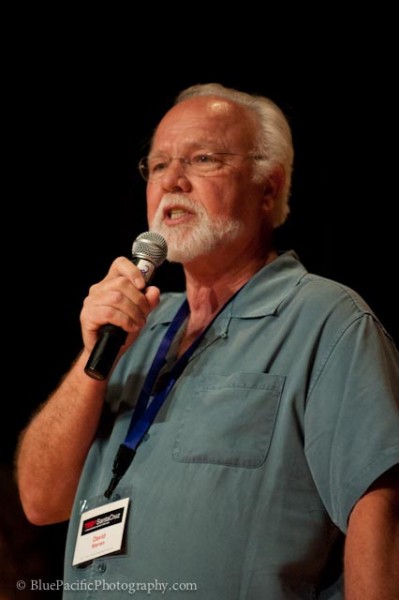Q&A with TEDxSantaCruz’s Founder and Co-organizer
David Warren, retired Cabrillo College Faculty member, educator, technologist, activist, husband, and father
What is the TED philosophy, and just what is the “x” factor?
 David: Basically, the TED philosophy/agenda is to spread ideas. It does this with the restrictions that a speaker cannot sell something, promote a religious idea, company, movement, or unscientific idea (read: pseudoscience) from the stage.
David: Basically, the TED philosophy/agenda is to spread ideas. It does this with the restrictions that a speaker cannot sell something, promote a religious idea, company, movement, or unscientific idea (read: pseudoscience) from the stage.
TED was originally a for-profit company founded in Monterey. Then Chris Anderson purchased TED in 2000 from the founder, Richard Saul Wurman, and turned it into a nonprofit. In 2006, TED Talks began to be provided free online through TED’s YouTube channel.
TEDx was launched in 2009, which made “independently organized” TED events possible. I applied for the TEDxSantaCruz license in 2010, and we had our first event at the Cabrillo Music Recital Hall on June 11th, 2011, to a sell-out crowd.
What prompted you to bring TEDx to Santa Cruz five years ago? What has the experience been like for you?
David: I retired from teaching full time at Cabrillo in 2006 but continued teaching part time in the Digital Media program, which I helped establish with Beth Regardz, until my daughter graduated from high school in 2009.
Kaila was successfully admitted to Lewis and Clark College in the fall of 2009, and only after her successful completion of the academic year, did I begin to explore how I might keep myself active in the community. Our family has always enjoyed watching TED Talks, and one day while exploring the TED website, I was drawn to the new TEDx program description. It was an epiphany for me as I saw how I could satisfy my insatiable curiosity while meeting some of the most inspired people in our community and beyond. I applied immediately.
Only until after receiving the license did I really start thinking about how this was going to manifest. I began looking for people to help, and this amazing community responded. I am still awestruck by our many brilliant people stepped forward. I am so grateful to Irene, Jon, Nada, Kirsti, and the legion of others who have made TEDxSantaCruz what it is today.
What happens during this daylong conference, and how would you describe the audience experience?
David: It is hard to describe the daylong event to people, as a typical response is, “What! Listening to TED talks, all day long? I can’t listen to more than three at a time without feeling overwhelmed!” However, I can only say that attending a daylong TEDxSantaCruz event is a transforming, participatory event unlike any you might imagine. Speaker after speaker reach deep to convey their passions, and the audience feels their commitment and responds accordingly. It is a shared experience that builds as the day goes on that, yes, leaves you exhausted but wanting more, in a delicious, soulful way.
Is this a cause that defines you? What drives you to give up so much of your time to organize TEDxSantaCruz year after year?
David: Personally, I don’t think TEDxSantaCruz defines me, but, it does greatly expand my sense of what a community can do and accomplish when we set our minds and hearts to something. The experience is very generative, and the ripples it can cause reach great distances with considerable impact.
How did you come up with this year’s theme, Radical Collaboration, and how do you yourself radically collaborate?
David: It was a team decision. In 2013, we didn’t offer a daylong event, but we organized a workshop for “Greater San Francisco Bay Area” TEDx organizers and held it at the Santa Cruz Museum of Art and History. It was successful and well attended. We considered offering another workshop and had conversations about it being hosted at the Stanford Design School, better known as the “D School,” which emphases “radical collaboration” as a major product of the school. The workshop didn’t happen, but the idea stuck.
Some people describe TED talks as an intellectual adrenaline rush. What do you think is so incredibly appealing about them, and what outcomes do you hope for in Santa Cruz?
David: Ideas are great, but deep down, we all want ideas to hit the pavement and improve our lives. Ideas are also part of the American DNA.
What can you say about the quality of the speakers this year and their “ideas worth spreading”?
David: Collaborating with UCSC this year has brought another level of community engagement to the mix. The speakers are fantastic and have responded to the theme creatively and enthusiastically.
To what do you credit the success of TEDxSantaCruz? What do you see in its future?
David: The success of TEDxSantaCruz is entirely because of the spirited brilliance of the volunteers. It just couldn’t happen with out them.
TEDx as a program is just in its toddler stage, yet the program has spread to 130 countries in more than 800 cities around the world. More tan 3,190 TEDx events have happened and have resulted in the uploading of 12,900 talks with 45 million views.
The future is bright. Rumor has it that the TEDx organizers from around the globe are pressing TEDx staff in New York to find resources and methods for TEDx organizations to begin to collaborate on a planetary scale. Whoa! Where might this lead!
